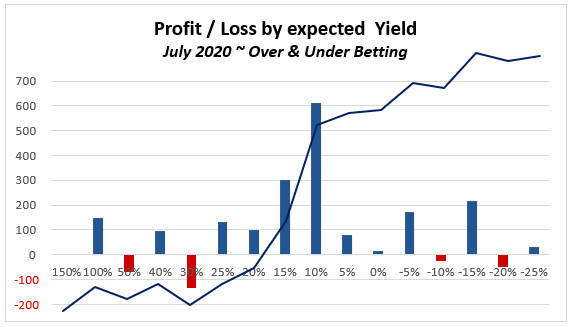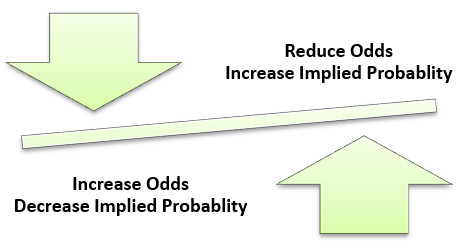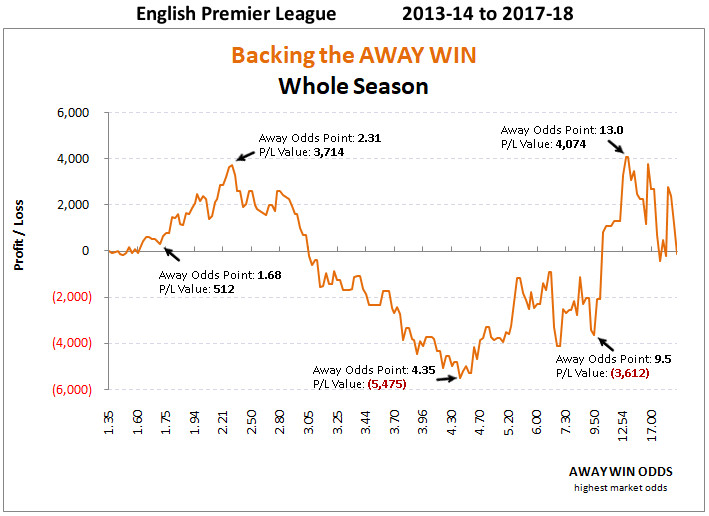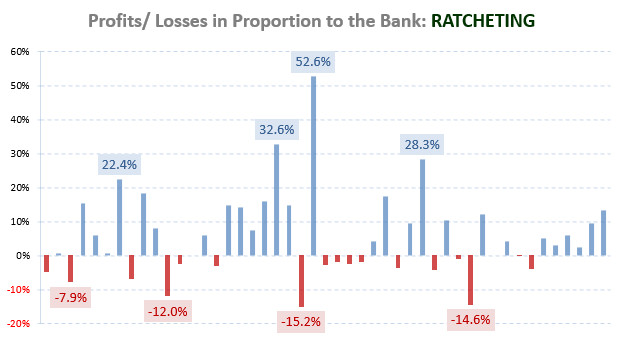
Why are there more Losers than Winners in the Sports Betting World?
A vast amount of gamblers never achieve betting returns high enough to crossover to the exclusive group of people who make a living from betting. Even worse, the majority of sports betting practitioners consistently lose more money than they win.
Punters learn the hard way that they lack knowledge and understanding of probabilities. They constantly overestimate their skills in judging the chances of predicting an outcome.
 Collage of Shutterstock images: 3Dmask
Collage of Shutterstock images: 3DmaskBookmakers remain in business and thrive at the expense of the majority of gamblers who possess two perfect flaws in their thinking:
- and
A degree of ignorance when it comes to calculating betting odds
This particular human behaviour guarantees bookmakers their profits but, it’s devastating for the bank balances of bettors. Does this sound familiar to you?
Good Knowledge and Understanding of Probabilities Required
To make money with sports betting, determining the probability of a bet outcome and calculating the corresponding odds for it are unavoidable.
Comparing the betting odds offered in the market with the expected fair price is a constituent part of discovering whether the odds offered for a bet are too high (containing value) or, too low (without value).
Here is an example:
The screenshot below shows an excerpt from Soccerwidow’s Value Calculator for the EPL game on 25/10/2014 between West Ham and Man City.
 1×2 Odds Calculation via Soccerwidow's VC: West Ham vs Man City on 25.10.2014
1×2 Odds Calculation via Soccerwidow's VC: West Ham vs Man City on 25.10.2014The statistical probability of a Man City win was 49%, corresponding to ‘true odds’ of 2.04 (100/49).
Translated into layman’s language the chance of Man City winning this match was approximately 50/50. Of course, this meant West Ham had a 50/50 chance of avoiding defeat (i.e. West Ham winning or drawing the game).
However, at kick-off the highest odds on offer for Man City to win were only 1.65, equating to a 60.6% chance (100/1.65).
Everyone who bought a bet on Man City to win placed their bets at the price corresponding to a 60.6% chance, whilst in truth City’s chances were only 49%.
Without a satisfactory knowledge and understanding of betting odds and probabilities, there were probably tens of thousands of punters backing Man City, clearly priced as the favourite in this match, at massively under-priced odds.
People who bet like this over and over again shouldn’t wonder why they lose more money than they win over the course of a season.
In contrast, the bookmakers make a good profit from bets of this nature. In this particular example, offering odds of 1.65 equates to a mathematical advantage over the punter in excess of 20%, meaning that their profit on a whole portfolio of bets like this is, in the long run, at least 20% or above.
Are you still with me?
You need to understand that the ability to calculate probabilities and odds is crucial and will enable you to better judge if odds are over- or under-priced (i.e. worthwhile or not).
Sports Betting Odds – How to Know that Odds are Fair
Betting odds which correspond to the theoretical calculated probability are called ‘fair odds’.
 Image: alexkatkov (Shutterstock)
Image: alexkatkov (Shutterstock)The West Ham v Man City match is by no means a one-off or even a rare example.
The market odds offered on any event very seldom represent fair odds. They are regularly either over- or under-priced.
Considering that there is always ‘error’ present in statistical calculations (deviation of predicted distributions to the actual observed results), any betting odds within a corridor of +/- 5% of the calculated probability can be called ‘fair’.
Soccerwidow’s Value Calculator has an error rate of approximately 3%. Translating this to our example, consistently betting on teams with a 49% chance of winning will produce an expected hit rate for similar matches of somewhere between 46% and 52% (49% +/- 3%).
As we have seen, the highest odds available for Man City to win prior to kick-off were based on a 60.6% probability. This was way outside the acceptable probability corridor and, therefore, the 1.65 betting odds were hugely ‘unfair’.
Laying Man City in this case would have been a ‘value bet’, certainly not backing them to win.
Compulsory Maths Lessons for Bettors
I am really sorry but, for anyone seriously interested in betting for a profit, a thorough and practical understanding of betting odds calculation is absolutely necessary.
Sadly, maths, statistics and probabilities have never been the most popular subjects in schools.
If you want to be a winner you need to make a stark choice: either force yourself to learn everything you can about probabilities and betting odds or, accept the fact you are gambling for entertainment purposes only with a strong prospect you will lose more than you will win.
If you value the money in your pocket there is no sense to continue betting on gut feelings alone waiting for the next ‘lucky streak’.
So long as bettors remain ignorant of betting odds calculation, bookmakers will continue to grow their businesses whilst bettors will continue to pay for it.
Conclusion
Betting odds are the prices for bets which very rarely represent the true probabilities of an event actually occurring. For the majority of bets offered in the market, odds are either over- or under-priced.
The ability to compare odds and buy bets at the best available prices is crucial for betting success, as is a deep understanding of probabilities and odds calculation. Without these attributes bettors are doomed to lose more money than they win.
However, before you decide to delve deeply into learning betting odds calculation, please consider carefully whether it is in fact a good use of your time. If you are not put off by the maths involved I can certainly assure you that the learning curve ahead is very, very steep and long.
Perhaps you can think of other things to concentrate upon and make money in a profitable, but more socially acceptable way?
If I haven’t persuaded you otherwise and you are still serious about wanting to make money with betting, then it is certainly worthwhile reading my other articles on this topic (see selection below) – and consider buying our Over/Under Betting Course and/or Value Calculator to help you master this subject.
Check out our store for more educational products on betting odds calculation: Soccerwidow’s Products
Here’s a selection of relevant and free explanatory articles delving deeper into the subject of betting odds calculation:
How do Bookmakers Tick? How & Why do they Set Their Odds as they do?
How Bookmakers’ Odds Match Public Opinion
What is Value? What is Value Betting?
What is the Ideal Sample Size for Accurate Predictions?
Probability, Expectation, Hit Rate, Value, Mathematical Advantage: Explained








Hi Soccerwidow!
I don,t understnd in your explaining with example with West Ham Mancester City, how
you received this fair odds 2.04 for Mancester City,s victory/ Away win in this case../
I can calculate over round or percentuage for 1,X and 2, or for under over etc.
A deeply knowledge of fair odds or when seem,that a gambler can has advantage bet is
between of more important quality to be successful by sports betting!
Thank you!
Tony
I’m interested in your approach and have a question about the screenshot from the value calculator, above. There are 25 Home games and 25 Away games displayed on the left. Then there are stats for 10 H2H games. Are these H2H games in the 25+25 group? That seems a lot.
Hi Patrick,
the H2H matches are only the games in which the two teams have played each other in the last 10 years. It may be 10 games, but often there are less.
Here’s a video on Youtube: How to input match & H2H data – True Odds Detector League Games with H2H history
Ok, so do you agree that although the bookmaker’s prices (shortly before kick-off) don’t completely represent the true probabilities, they are accurate to roughly +/- 3%?
Am I right in saying that’s about the same kind of accuracy of the true odds given by the Value Calculator?
So say for example, shortly before kick off in a major league, what’s a better predictor of the true odds for Team A to beat Team B? The VC, Pinnacle, or the going price on the Betfair exchange?
Hi Jordan, the VC as well as opening prices of bookmakers are probably all are pretty accurate, at least as much as possible. Bookmakers have to take public opinion into consideration when pricing bets, anticipating the demand for a certain bet.
Therefore, you need to keep in mind that both, Pinnacle and Betfair exchange prices are ruled by supply and demand. This means that the closer to kick off, the more punters read the news, the more people bet on a certain outcome. As punters are regulated by their gut feelings it may push the prices in the wrong direction (if you wish to convert odds into their applied probabilities).
Hi Scoccerwidow!
I read an article on pinnacle sports where if I understand him correctly the writer claims that the odds/prices on pinnacle sports (with their betting margin/overround removed) are highly efficient for the home/draw/away betting market for football matches based on 132,645 matches globally since 2007, i.e. their prices for all outcomes are always fair (if you don’t take their over round into account). If you scroll down to the first graph it shows the expected outcome probability versus the observed outcome probability.
https://www.pinnacle.com/en/betting-articles/educational/why-pinnacle-doesnt-close-or-limit-accounts
What do you think about the article? Do you disagree with what is being written?
I am confused because it appears to be completely contrary to what you wrote in this article. That is, if the prices for bets on pinnacle are very similar to other bookies, which they most often appear to be.
I assume the writer is implying that in placing bets with them (for Home/draw/away bets) shortly before kick-off, value betting is never possible, because their prices always represent the actual true probabilities?
I don’t know whether to believe that the information in the pinnacle article is based on reliable data, or if pinnacle are somehow just trying to somehow mislead the reader into believing that their odds are always fair.
Best regards, Jordan.
Hi Jordan, the article you are referring to is mainly targeted at traders. It’s mainly about that trades close to kick-off reduces the likelihood that the edge will change dramatically. There was a similar discussion on another article and you’ll find it here: What is Value? What is Value Betting?
Regarding the scatter plot with the expected outcome probabilities (odds) and the observed outcome frequencies (results) please have a close look especially at the probabilities above 70%. Chose a dot, e.g. ‘expected outcome probabilities’ 72% and check against the corresponding ‘observed outcome frequencies’ which, in this example, is 69%. 3% sounds little but this is where the bookmakers make their money; they sell a bet which should be priced for 1.45 at 1.39.
On the contrary, pick a dot in the lower probabilities, e.g. ‘expected outcome probabilities’ 19% and check against the corresponding ‘observed outcome frequencies’ which shows up with 21/22%. Here, bookmakers price bets which should be 4.75 at prices of around 5.3.
We have introduced HDAFU tables with inflection point graphs to visualise this market dynamic. Here’s an article on this topic: Finding Betting Odds Inflection Points
Therefore, the information provided in the Pinnacle article is correct but, your conclusion that placing bets shortly before kick-off doesn’t contain value is wrong. Bookmaker prices hardly represent the actual true probabilities. The ‘error’ is tiny, as shown above only in the region of 3%, but it’s there. And this isn’t an ‘error’; it’s the business of the bookmakers to stay in business.
Dear Soccerwidow,
first of all, thank you for your work!
I’m a beginner, and I found many useful informations here.
I have a question to this article, to the example between West Ham-Man.City
How do you calculated the draws?
Draws from both teams at home and away?
Sorry for my english!
The odds are calculated using the Value Calculator. However, if you are a total beginner to odds calculation then you should probably consider purchasing the Fundamentals of Sports Betting course. “Unfortunately” the course is about Over/Under betting, but this is truly the best betting type to start understanding the bookmaker market and odds calculation. 1×2 is maybe more exciting but, mathematically speaking, far too complicated.
I have a question about currency. We don’t use Euro (or USD) where I live. If I deposit money, the bank will always take a 1.75 % “currency addition” (not sure what it is called in english). It basically takes whatever the exchange rate is at the current time, multiplies it with 1.0175, and that is the rate you get.
How can I avoid this, as it will basically eat my profits? Do you have any recommendations?
Dr. Currency
You’ll have to open somewhere a currency account which you will use for betting only, e.g. Neteller, either in EUR or US$. You then transfer there your starting bank, and do all deposits as well as withdrawals via this currency account.
When your bank starts growing (I assume that you have a winning strategy) then you just withdraw to your local bank account as much as you want, in single chunks.
Currency losses, e.g. multipliers, are not avoidable, but what is possible is to pay attention to the currency exchange, and wait with the transfers to your own currency until it’s a beneficial as possible for you.
Nice article! I completely disagree on the true odds value calculation though. In my opinion past matches h2h are irrelevant. Main reason is because sport is played by people, not random teams. Player changes, coaches changes, mentality and playing style changes, player humor and fitness changes constantly. I think the best way to find value is trying to see both side of the teams, how they’re gonna enter the game and conduct the game, what will happen if a team scores, and so on… trying to predict the outcome of every second of the match and how each player and coach will react to events… from this then estimate true probability outcome of the matches and then choosing the market overpriced side relatively to true probability outcome. Just an example last weekend in italy Juventus against Napoli: 1 at 2.15, x at 3.4, 2 at 3.4 opening bet365 odds (european odds). Every person I know thought Napoli was gonna win and also expected over 2.5 goals because of recent matches between them. But analyzing the game psychologically both teams have won a massive amount of matches, Napoli is first in the leaderboard with a point more than Juventus. So: both teams don’t want to lose, Napoli will consider a draw a good result too. Juventus has a nice chance to win and surpass Napoli in the leaderboard and they will try to take it but they won’t push too like crazy to risk a counterattack from Napoli; Juventus will be a little less pleased than Napoli with a draw but still they will be fine. Also a lot of important matches where each team wants to avoid a loss and matches between big teams usually finishes 0:0 at halftime (because they play cautiously). So my prediction for the game: double chance 1-x, under 2.5, x at ht, 0:0 at half time, x in the second half, dc 1-x in the second half. I choose over all 2 bets htx – ft 1 and htx – ft1 (hlf time / full time market). result: first half 0:0, late goal by juventus and full time result 1:0. Of course not every prediction comes true but I think you should take more psychology into calculation and convert it in numbers. instead of using h2h data then years old. I’m not saying h2h data is worthless. And another thing you’re giving each value to every year h2h but in my opinion old h2h more than 3 years means nothing, different players, different coaches, so different style of playing, different team goals for the season… I personally don’t remember what I did last week, how can a player remember what he did in a match 10 years ago? Recent h2h should be weighted more in my opinion since will impact the current game more. Same pattern for last matches played, recently matches played should be weighted more since they are likely to give a bigger impact on the current match played. For example a team losing last matches and in danger will likely do all they possibly can to win next game, like Frosinone which played away against Empoli on the same day of Juventus vs Napoli.
Of course to do this take a huge amount of time for each match so you have to specialize on few leagues few teams, etc, and you have to watch the matches to try to gather every possible info, take notes on the team and players… Number of matches betted is low so your variance increases but also your profit because you have more info to judge the outcome; does higher risk and amount of work justify higher profit? You could calculate it but then again you’re going to spend more time on it… Let’s try to calculate how much time I spent on writing this comment aahahahahahahaha x-)
Ok I’m done. I would really like to hear your thoughts though.
Cheers
Hello Giuseppe,
Many thanks for your comment.
Time is the biggest factor when analysing a set of matches large enough to provide enough bets for a profitable portfolio.
Collecting the data is one thing, but making sure it is accurate (especially with historical odds) is another challenge to surmount. This is even before you combine the data sets and spend time choosing which bets to select.
Our approach is as economical as it can be and saves the time we would take to watch matches, read news, and, for example, react to team line-ups when they are released an hour before kick-off.
Instead, we are only interested in the numbers. The historical head-to-head results are an important correction factor to the last sequence of games each team will have played leading up to the fixture in question.
Is the fact that team A hasn’t lost to team B at home in the last 20+ encounters not an underwriting consideration when the teams come to play their next match against each other? The fact is that it is a vital indicator of potential future results. Just as important as each team’s string of last 25 league results, for example.
We only look at the last 10 calendar years when it comes to H2H results but there are sequences certainly in the English Premier League where teams have a much longer hold over some of their opponents. Some teams are hugely affected when looking at their track record against an opponent.
The one stand-out example I can think of is the Man Utd v Aston Villa fixture (home or away). If you look at the sequence of results in the last 20 years, the two teams have played each other 45 times – Villa have won just twice, one of those a League Cup game against an under-strength United side.
Indeed, they’ve met 22 times in the last 10 years, with only one Villa victory.
We work with statistics and statistics alone. Believe me, this is far more efficient way of predicting results than doing all the hard analytical work and then dispensing with it by betting on gut-feeling once you’ve seen the line-ups or mulled over the current form of both teams. Consistency with bet selection has to be uniform to give you any chance of gauging your performance.
It sounds like you are making emotional decisions based on how you want the match to be played out based on your logical conclusions. Unless you have written rules for every situation you are likely to encounter and make the same decision in each case, then you have little chance of producing consistent results. There are an infinite number of variables so it would be impossible to come up with a rule book to cope with the circumstances surrounding each match you analyse.
Emotionless betting is key to success – check out our recent article: The Gambler’s Worse Enemy!
Thanks again for taking the trouble to write and good luck!
Thanks for the quick reply !
What is the minimum number of matches to estimate the error with a good accuracy ? Is it like this the confidence interval at 95% : (0,98/square root of number of matches)
So more matches are in a cluster more accurate is the error estimation ?
I think this is a general rule in statistics, the more data in a cluster the more accurate is the error estimation.
Unfortunately, in football it is very difficult to collect enough data. The EPL for example has only 380 matches each season, and there 20 different teams, each playing only 19 times at home, or away.
These are very very little numbers to ever be able to reach a confidence interval of 95% in any cluster.
“Soccerwidow’s Value Calculator has an error rate of approximately 3%”
How do you have calculated this error rate ?
Hi Gilles,
the error is calculated by clustering the own calculations into small groups such as 40 – 44.99%, 45 – 49.99%, 50 – 54.99%, etc., and then afterwards counting the number of occurrences bets actually won (or lost) in the group.
For example, in this article I write about Manchester City, and them having had a probability of 49% to win away. They would have fallen into the 45 – 49.99% cluster of teams to win away.
It of course takes a while until there have been enough matches analysed as they all have to have similar probabilities as Man City (somewhere between 45 – 49.99%).
The smaller the groups, and the more games fall into each group the more accurate the findings, obviously.
However, if you then have, say 100 matches in the group, and you count how many of the away teams have actually won, you’ll find that it’s within the expected hit rate of 45 – 49.99%, +/- 3% error.